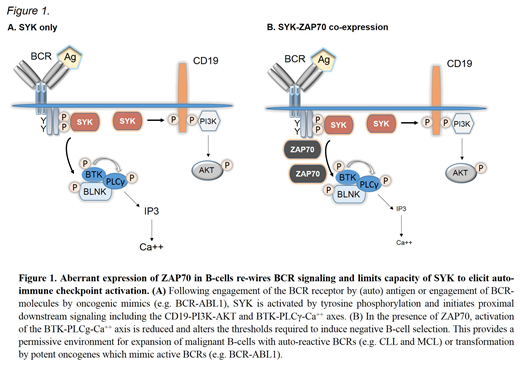B-cells are under intense selective pressure to eliminate autoreactive or premalignant clones. B-cell receptor (BCR) signals are required for survival, however, BCR-signaling exceeding maximum thresholds often reflects signaling from an autoreactive BCR or a transforming oncogene and triggers negative selection and cell death. The tyrosine kinase SYK initiates BCR-downstream signaling in B-cells while its close relative ZAP70 is almost exclusively expressed in T-cells. Interestingly, the segregation of SYK to B-cells and ZAP70 to T-cells is less confined in malignant lymphopoiesis suggesting that the balance of these related kinases may alter signaling output in disease and contribute to development of leukemia. As previously shown in B-cell chronic lymphocytic leukemia (B-CLL), we identified aberrant ZAP70 expression as a frequent feature in multiple other B-cell malignancies that depend on survival signals from a functional (pre-) BCR (E2A-PBX1+ pre-B ALL, and mantle cell lymphoma) or harbor oncogenic mimics of the BCR (BCR-ABL1+ B-ALL). Studying SYK and ZAP70 expression by single-cell Western blot, co-expression of the two tyrosine kinases was extremely rare in normal B- and T-cell populations. In contrast, >50% of tumor B-cells in mantle cell lymphoma, pre-B ALL and CLL co-expressed SYK and ZAP70.
Despite their structural similarities, genetic deletion and engineered reconstitution of SYK and ZAP70 in human B-cell lymphoma cells revealed striking functional differences. Proximity-dependent biotin identification (BioID) analyses identified that SYK, but not ZAP70, engaged the PI3K pathway via interaction with CD19. Consistent with this, reconstitution with SYK and SYK-ZAP70 but not ZAP70 alone promoted survival and proliferation. Detailed analysis of BCR-mediated cascades in lymphoma cells expressing SYK, ZAP70 or SYK-ZAP70 established that ZAP70 is only weakly efficient at propagating BCR-mediated calcium and downstream pathway activation in B-cells. Strikingly, co-expression of ZAP70 with SYK resulted in re-wired BCR-signaling of intermediate strength: compared to cells expressing only SYK, SYK-ZAP70 co-expressing cells had markedly reduced activation of the BLNK-BTK-PLCγ pathway, further reflected in BCR-induced Ca2+ signaling with delayed onset, lower amplitude but longer duration. In this way, we speculated that SYK and ZAP70 may be present within close proximity at the apex of BCR-initiated interactions, and hence compete for downstream substrates resulting in a re-wiring of classic signaling programs propagated normally by SYK. To explore this, we utilized proximity ligation assays (PLA) to monitor the proximity of SYK and ZAP70 in resting or BCR-stimulated B-cells, and found that SYK and ZAP70 co-exist within close proximity consistent with the view that varying levels of these kinases may alter B-cell signaling output. Functional experiments further showed that phosphomimetic activation of SYK, but not ZAP70, induced hyperactivation of PI3K-signaling and acute BTK-mediated cell death in pre-B ALL cells. In line with altered BCR-signaling strength and quality in SYK and ZAP70 co-expressing cells, over-expression of Zap70 in pre-B ALL cells rescued auto-immune checkpoint activation induced by hyper-activation of BCR-associated signaling. To study functional consequences of SYK-ZAP70 co-expression during normal B-cell development, we generated a novel knock in Zap-70+/Mb1-Cre+mouse model, to induce conditional expression of Zap70 in the B cell compartment from the proB stage. Consistent with compromised central tolerance checkpoints, Syk-Zap70 co-expressing pro/pre-B and immature B-cells had reduced spontaneous apoptosis rates and gave rise to autoantibody production against multiple self-antigens.
Importantly, our findings highlight a previously unrecognized role for ZAP70 in oncogenic BCR-signaling and we conclude that the co-expression of ZAP70 mitigates the ability of SYK, downstream of an autoreactive BCR or a transforming oncogene, to trigger negative B-cell selection and cell death (Figure 1).
Weinstock:Celgene: Research Funding. Meffre:AbbVie: Consultancy, Other: Grant.
Author notes
Asterisk with author names denotes non-ASH members.


This feature is available to Subscribers Only
Sign In or Create an Account Close Modal